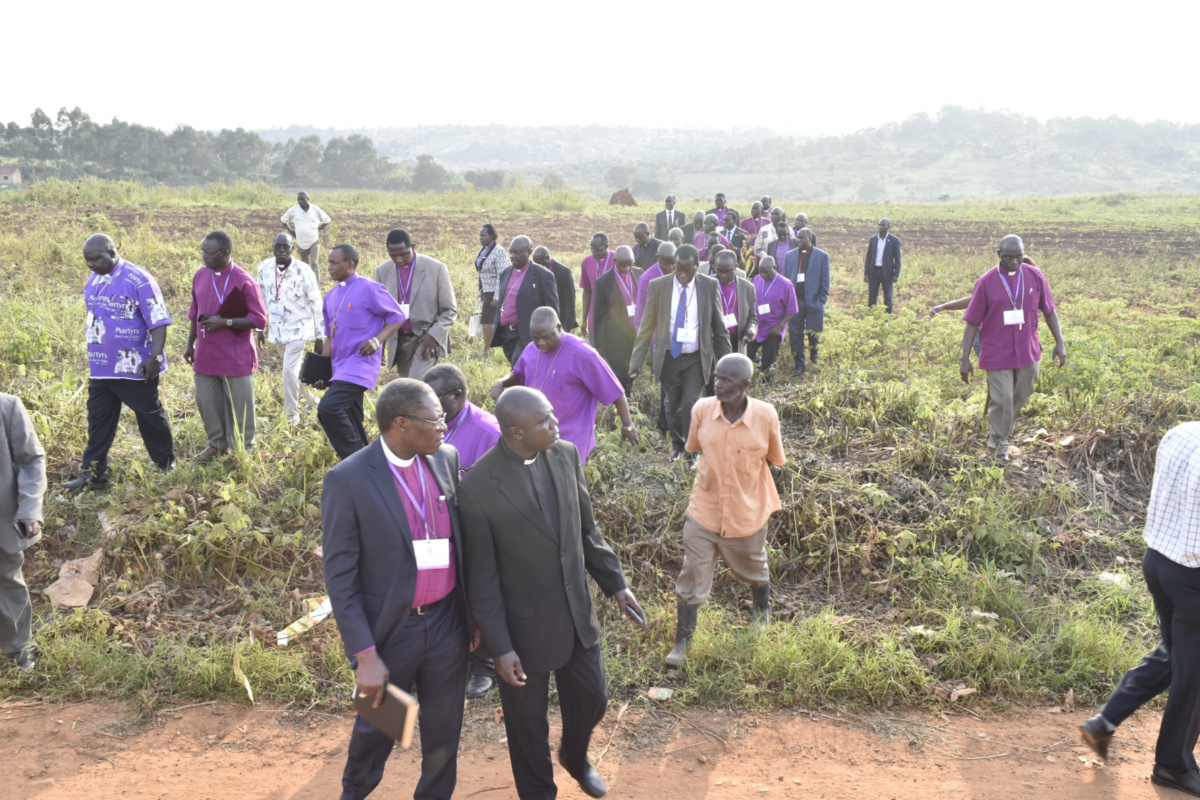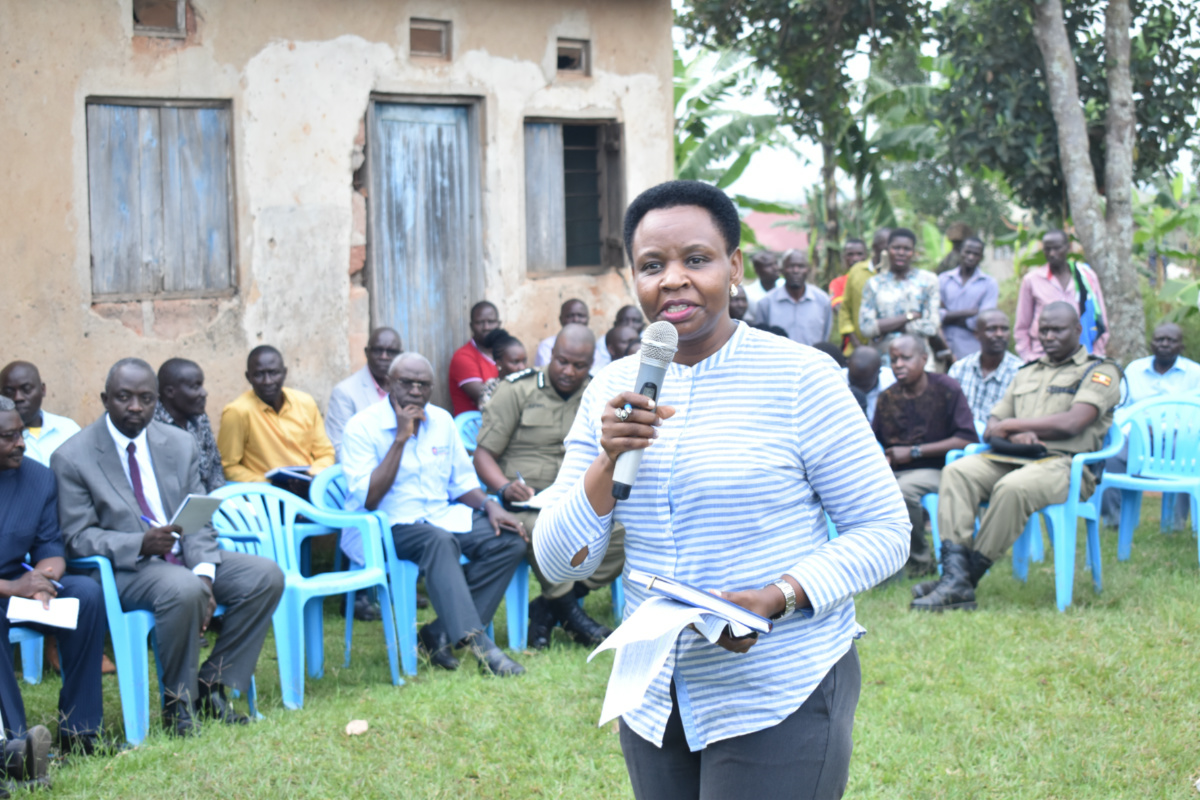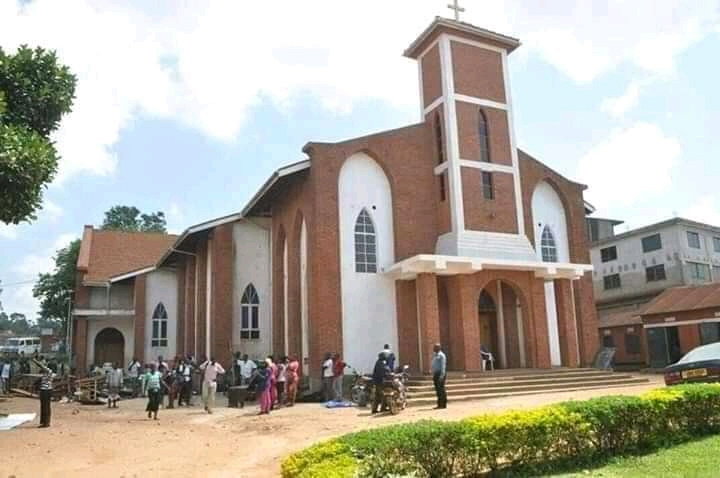
JOHN SEMAKULA reports from Uganda on rising tensions between churches and some of those living on church lands…
Kampala, Uganda
Owning huge tracts of land should ordinarily be a blessing. But not in Uganda. Many landowners whose plots sit idle are facing conflicts with squatters. And big institutions, including the church, have not been spared.
The Anglican Church of Uganda is among the institutions facing land conflicts. One of the major landlords in Uganda, the Anglican Church was given 262 hectares of land at Ntawo in Mukono district, central Uganda, on 27th October, 1939, by Hamu Mukasa, a chief in Uganda’s biggest kingdom – Buganda. According to government records, the church legally acquired the land and in 2010 transferred it to a university it had founded in 1997 – Uganda Christian University. By handing over the land to UCU, the church hoped it would boost the institution’s financial base.

Bishops from the Anglican Church of Uganda tour the institution’s land on Ntawo village, Mukono District, on the day they were attacked by squatters in 2016. The group was led by the former Archbishop of the Anglican Church Stanley Ntagali. PICTURE: John Semakula.
But in the years the land lay unused, people had moved in. Having since blocked UCU from possessing its property, those living on the land include some who had unknowingly bought plots of land from other squatters occupying the UCU land.
Florence Nankya is one of them. In 2006, the 62-year-old bought a six-by-15 metre plot of land at Ntawo village. For a casual labourer who had spent her entire life renting, the acquisition was a godsend. She eventually built a four-roomed house on her new plot of land.
“I appeal to the government to intervene and ensure that the hundreds of tenants occupying the church land are protected from an imminent eviction.”
– Florence Nankya.
Recently, however, the peace of her seven-member family was disrupted when the Anglican Church of Uganda, through the university, notified the family that they were illegally occupying church land and threatened to evict them.
Nankya told Sight she doesn’t have anywhere else to go with her children should the church make good on its threat to evict them.
“I appeal to the government to intervene and ensure that the hundreds of tenants occupying the church land are protected from an imminent eviction,” she said.
The church’s land in Ntawo is owned under the Mailo land tenure system, where land is registered and owned in perpetuity by the holder of the land’s title. This land tenure system, common in central Uganda, stems from the Buganda Agreement signed in 1900 between Buganda Kingdom and Uganda’s then-colonial masters – Britain.
The system allows people, such as Nankya, who have no land title, to legally purchase some rights as tenants through an annual fee, called ground rent. The system also guarantees the landlords the security of being able to repossess or sell off their land anytime with the condition that tenants and lawful squatters – defined as those who occupied and utilised the land unchallenged for 12 years or more before the coming into force of the current constitution in 1995 – are compensated.
The Anglican Church says it is willing to compensate lawful tenants in Ntawo. But this is poor comfort for Nankya and hundreds of other squatters and tenants who the church does not recognise as legal squatters.
Daniel Seruwagi, one of the local leaders in Ntawo village, told Sight there are currently more than 2,000 families occupying the church land as both tenants and squatters.
Mesharch Katusiimeh, an associate professor of leadership at Kabale University in Uganda, has warned that unless the situation is resolved quickly, the Ntawo land conflict could turn into a bloodbath if it is not resolved.
His comments aren’t without precedent – in 2016, some of the squatters on the land surrounded the then-Archbishop of the Anglican Church of Uganda, Stanley Ntagali and 38 bishops, as they toured the disputed land. Police had to be called in to rescue the prelates and many of the people suspected to have attacked the prelates were charged in court with threatening violence.
Speaking during the Heroes Day national celebrations on 9th June in Kampala, Uganda’s President Yoweri Museveni expressed his disapproval of the Mailo land tenure system, describing it as “a very bad and evil system”. Museveni argued that the system allows land conflicts to thrive and that tenants in central Uganda should be entitled to full ownership of the land they occupy as is the case in other parts of country.

Uganda’s Anti-Corruption Unit head, Lieutenant Colonel Edith Nakalema addresses local leaders and police in Mukono on the issue of illegal occupation of the church’s land in Ntawo recently. PICTURE: John Semakula.
A spokesperson for Uganda’s lands ministry, Dennis Obbo, however, told Sight that land disputes which have pitted the Anglican Church against those living on the land are not restricted to the central region, citing Anglican dioceses in eastern and north-western parts of Uganda which are facing similar challenges.
He said the lands ministry was in the process of reaching out to the affected dioceses, to teach them how to protect land against illegal squatters. However, he faulted the Anglican Church for “failing to comprehensively register the land with the ministry”.
“The third and fourth generation grandchildren of the people who donated land to the church are taking advantage of the gap, to reclaim it,” Obbo commented.
He advised squatters and tenants living on church land to regularise their occupancy with their landlords and noted that the ultimate goal of government is to ensure that tenants and squatters are not evicted, something which could render them landless and homeless.
Bishop James William Ssebaggala, of the Mukano Diocese, the area where the disputed land is located, told Sight the church had taken a number of measures to stop what’s referred to as “land grabbing” in his diocese – but with minimal success. He called for a review of the land laws that he said gave too much power to squatters.
In the meantime, to protect the church’s land against illegal occupiers, Bishop Ssebaggala said the church was encouraging priests to plant trees on it.
The Ntawo land saga is not the only one that has drawn public attention recently in Uganda. In May, 2021, a minister in the Ugandan Government was reported to have beaten and injured an Anglican priest and other two church leaders in eastern Uganda, accusing them of encroaching on his land.
Rev Simon Peter Olato, the parish priest of Wera Church of Uganda, and two laymen – Benjamin Otasono and Simon Peter Eriku, were planting cassava on the land when they were attacked. They were later admitted to a health facility with injuries. The Anglican Church has claimed that it was Minister Musa Ecweru who had encroached on their land. Ecweru, meanwhile, has maintained his innocence.
Last August, people who claimed the land on which a 40-year-old Anglican Church building had been built are accused of destroying the structure following a dispute over the land. Some 17 people are currently facing trial in a court in Kampala over the demolition of the church – St Peter’s in Ndeeba, a Kampala city suburb.
The Archbishop of the Anglican Church of Uganda, Stephen Kaziimba Mugalu used that incident to call for an end to land grabbing in the country.
Kaziimba explained that the church had previously been reluctant to mark its land because it was assumed the “morally upright” people who donated land to the church would not attempt to seize the land.
“But today, people forge agreements that [they say] were made many years ago by their grandparents, in order to reclaim land that was donated to the church,” he said.

The 40-year-old St Peter’s Church building in Ndeeba, Kampala, that was demolished in August last year following a conflict over land where it was located. PICTURE: Courtesy of the Anglican Church of Uganda.
In 2019, the country registered 345 cases related to land grabbing, according to the police crime statistics. The cases reported included unlawful assignment of tenancy, illegal eviction, threatening violence, concealing title deeds, and criminal trespass.
According to Katusiimeh, of Kabale University, the increasing land disputes in Uganda reflect historical social injustices in which the people were thrown off the land which was given to the church by colonial administrations.
Other Christian denominations are also facing land conflicts. During a celebration to mark the 54th anniversary of the Kampala Catholic Archdiocese in October last year, the former Archbishop of Kampala, Dr Cyprian Kizito Lwanga, said there were growing numbers of government officials grabbing idle church land.
Without divulging details, Lwanga, who passed away in April this year, narrated an incident where he was shocked to discover that someone had a land title for church land. He advised the government to protect church land.
The situation is unlikely to be resolved soon.
In an article published by International Institute of Social Change in The Hague in 2019, Henni Alava and Catrine Shroff wrote that the “actual extent of the landholding of the old missionary-established churches in Uganda is unknown, even to the churches themselves”.
“Only a fraction of the land controlled by Churches is formally surveyed and registered,” because, as one diocesan land officer quoted in the article said, “the Church builds on trust”. The researchers added that “Dioceses also lack the funds required for surveying and few steps have been taken to gather national level data.”
In the meantime, as the article points out, increased pressure on land generally in Uganda means that until the issue is properly dealt with through formal processes, disputes between churches and those living on the land are likely to continue.
The correspondent, John Semakula, is an independent journalist and a lecturer at Uganda Christian University.





